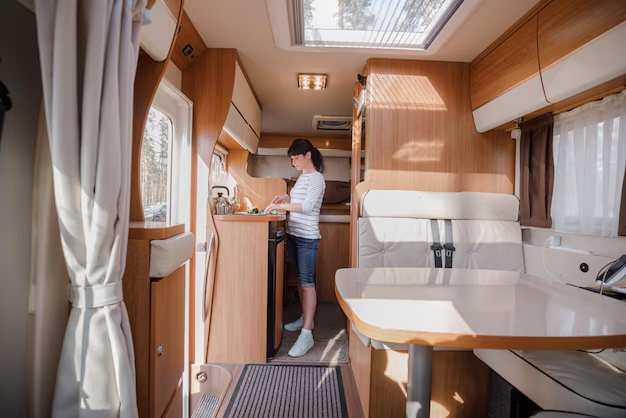Understanding the Propane Usage of Your RV Refrigerator: What You Need to Know
When you're exploring the great outdoors in your RV, being able to store food and beverages is essential. This is where your RV refrigerator comes in handy. Operating efficiently on propane, a common energy source in RVs, these refrigerators allow you to keep your items cool even when you're miles away from an electrical hookup. But how much propane does an RV refrigerator really use, and what factors play into its consumption? Let’s delve into this topic and provide a comprehensive understanding of propane usage in RV refrigerators for those planning their next adventure.
🏕️ The Basics of RV Refrigerators: How They Operate
Understanding the Mechanism
RV refrigerators typically operate using absorption technology, which differs from the compression method seen in residential refrigerators. The absorption refrigerator uses a combination of heat, ammonia, water, and hydrogen gas to create a cooling effect inside the unit. Propane acts as the heat source that facilitates the refrigeration cycle.
Dual-Power Systems
Most modern RV refrigerators are dual power, meaning they can run on both propane and electricity. This feature offers flexibility depending on your hookups and energy availability. When you're boon docking (camping without hookups) or in areas with no electrical access, propane becomes indispensable.
🔍 Quantifying Propane Usage: What to Expect
Average Consumption Estimates
Understanding how much propane your RV refrigerator uses can help you manage your resources more efficiently. On average, an RV refrigerator can consume about 1.5 to 3 pounds of propane per day when operating consistently over a 24-hour period. Of course, this can vary based on several factors, including the refrigerator's size and efficiency.
Factors Affecting Propane Consumption
- Size and Model: Larger refrigerators generally consume more propane. However, newer models tend to be more efficient than older units.
- Ambient Temperature: Higher external temperatures can cause your refrigerator to work harder, thus increasing propane usage.
- Refrigerator Load: A fully stocked refrigerator retains cold better and uses less energy than an empty one.
- Ventilation Quality: Proper ventilation ensures efficient operation, reducing unnecessary energy consumption.
Importance of Monitoring Usage
For extended camping trips, it's crucial to monitor your propane usage to avoid running out unexpectedly. Installing a propane gas monitor can provide real-time data on consumption rates, helping you plan refills appropriately.
🌟 Optimizing Propane Consumption for Your RV Refrigerator
Routine Maintenance Tips
- Clean the Components: Keeping the burner assembly and flue clean can enhance efficiency and lower propane usage.
- Check for Leaks: Regularly inspect the gas lines and connections for leaks, which could lead to excessive usage or safety hazards.
- Defrost the Unit: Frost buildup can hinder efficiency. Regular defrosting ensures the unit runs optimally.
Smart Usage Practices
- Leveling Your RV: Absorption refrigerators need to be level. Operating on an incline can lead to inefficient cooling and increased propane use.
- Optimize Door Usage: Remember the adage, “Don’t leave the fridge door open!” Each time it's opened, the refrigerator must work harder to restore its cooling levels.
- Pre-Cooling: Before setting off, plug your refrigerator into electricity to get it cooled down. Switching to propane once it reaches the desired temperature can save significant propane.
🔧 Troubleshooting Common Issues
It's not uncommon to encounter issues with RV refrigerators. Some common problems include:
- Uneven Cooling: Often caused by improper leveling or inadequate ventilation.
- Failure to Ignite on Propane: Check for blockages in the burner or issues with the igniter.
- Strange Noises: These may be due to loose components or the need for proper leveling.
When to Seek Professional Help
While some maintenance tasks are straightforward, others might require professional attention, especially if gas line repairs or complex component replacements are needed.
🧩 Alternative Energy Sources: When Propane Isn't Enough
Exploring Solar Options
With advancements in solar technology, adding solar panels to your RV can significantly reduce reliance on propane. Solar power, combined with a reliable battery storage system, can offer a sustainable and cost-efficient power source for extended trips.
Backup Generators
Carrying a portable generator provides an additional backup power source. It can be especially useful in emergency scenarios where both propane and electricity are inaccessible.
📊 Resource Planning: Preparing for Your Next Trip
How to Calculate Your Needs
Assess the duration of your trip and the expected propane consumption based on your usage habits. Using a digital scale to weigh propane tanks before and after use can give a good estimate of daily consumption.
Storing Propane Safely
Ensure that propane tanks are stored securely and are routinely checked for any damages or leaks. Proper storage not only ensures safety but also aids in efficient energy use.
🚀 Key Takeaways for Efficient Propane Use in RV Refrigerators
Here's a distilled summary of how to effectively manage propane usage in your RV refrigerator:
- Monitor Propane Levels: Keep track of consumption to avoid running out unexpectedly.
- Maintain Regularly: Ensure components are clean and damage-free for efficient operation.
- Utilize Dual Power: Where possible, make use of electrical hookups to conserve propane storage.
- Pre-Cool and Plan: Initialize cooling using electricity and plan ahead by knowing your unit's consumption patterns.
- Consider Alternatives: Explore solar and generator options as complementary energy sources.
Equipped with this knowledge, you can plan your RV adventures with confidence, ensuring that your refrigerator runs efficiently and keeps your perishable goods fresh. This understanding not only adds convenience to your travels but also contributes to a more sustainable and cost-effective camping experience. So pack up your RV, hit the open road, and enjoy your time in nature without the worry of unexpectedly running out of propane!

